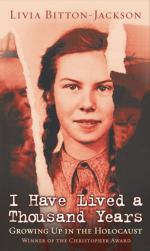
|
| Name: _________________________ | Period: ___________________ |
This test consists of 15 multiple choice questions and 5 short answer questions.
Multiple Choice Questions
1. Where are many families sleeping in "The Ghetto"?
(a) The synagogue.
(b) Abandonded buildings.
(c) In tents.
(d) Outside.
2. For what does Old Mr. Stern pray?
(a) Safety for children.
(b) Courage and bravery for the men.
(c) Everyone's safe return.
(d) The long road that lies ahead.
3. How does Elli feel as she travels away from Auschwitz?
(a) Hopeful.
(b) Tired.
(c) Overwhelmed.
(d) Scared.
4. What is Laura's reaction about Aunt Serene's orders to go to a side different from Laura's during selection?
(a) Laura begs to go with her sister.
(b) Laura chases after her sister.
(c) Laura keeps quiet about her sister.
(d) Laura hides behind Elli.
5. After their showers at Auschwitz, what do Elli and her mother desperately want?
(a) Sleep.
(b) Water.
(c) Entertainment.
(d) Food.
6. Elli thinks her mother's favorite child is _______________.
(a) Bubi.
(b) Somorja.
(c) Elli.
(d) Jansci.
7. Why does Elli return to her school after the schools are closed?
(a) To clean the school.
(b) To get her personal belongings.
(c) To say goodbye to everyone.
(d) To get her final report and diploma.
8. Why does Laura hate leaving her sister behind at Auschwitz?
(a) Celia is weak minded.
(b) Laura cared for Celia's children.
(c) Celia suffers from diarrhea.
(d) Laura took care of Celia.
9. What do the aunt and cousins say about Elli and her mother's reaction to their first serving of food at Auschwitz?
(a) To send it back to the kitchen.
(b) To try eating more again.
(c) To throw it away.
(d) To give it to them.
10. How does Elli's father react to Bubi's story from the middle of the night?
(a) Bubi's father makes plans.
(b) Bubi's father keeps him at home.
(c) Bubi's father ignores him.
(d) Bubi's father cries.
11. Where do Laura and Elli visit before they traveled to Nagymagyar?
(a) The school.
(b) The cemetery.
(c) The synogogue.
(d) The river.
12. As the guards order women to take their blankets inside, what do they do to the women?
(a) Shoot at them.
(b) Hit them on the head.
(c) Steal their food.
(d) Slap their wrists.
13. When Elli sees her reflection on June 3, what is her reaction?
(a) She is shocked.
(b) "I look like a man."
(c) "That isn't so bad."
(d) She is pleasently surprised.
14. What story does Bubbi tell his family in the middle of the night?
(a) Nazi soldiers in Budapest.
(b) Hungarian police leaving their town.
(c) Hitler coming to their town.
(d) The war ending.
15. What does Aunt Serena do with dishes before leaving on May 2?
(a) Buries them.
(b) Burns them.
(c) Gives them away.
(d) Smashes them.
Short Answer Questions
1. What happens to the women in the showers at Auschwitz?
2. How does Bubi react to the news from the town crier?
3. As Bubi leaves his mother at Auschwitz, what does she see?
4. Who is head of the barracks and inmates at Auschwitz?
5. On what does Elli's poetry focus?
|
This section contains 521 words (approx. 2 pages at 300 words per page) |

|




